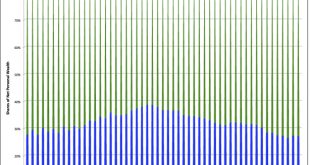from Asad Zaman Lecture 5 of Advanced Microeconomics at PIDE. The base for this lecture Hill & Myatt Anti-Textbook Chapter 4 on Consumer Theory. Hill and Myatt cover three criticisms of conventional microeconomic consumer theory. Economic theory considers preference formation as exogenous. If the production process also creates preferences via advertising, this is not legitimate. Consumers are supposed to make informed choices leading to increase welfare. However, deceptive...
Read More »Randomization — a philosophical device gone astray
from Lars Syll When giving courses in the philosophy of science yours truly has often had David Papineau’s book Philosophical Devices (OUP 2012) on the reading list. Overall it is a good introduction to many of the instruments used when performing methodological and science theoretical analyses of economic and other social sciences issues. Unfortunately, the book has also fallen prey to the randomization hype that scourges sciences nowadays. The hard way to show that alcohol really is a...
Read More »U.S. Wealth Pyramid
from David Ruccio On Wednesday, I referred to the wealth pyramid in the United States. But I didn’t really represent that pyramid in the chart I provided. Here it is, above, with the wealth share of the bottom 50 percent (in red), the middle 40 percent (in blue), and the top 10 percent (in green)—a wealth pyramid for each year, from 1962 to 2014. Or, here’s another, if you prefer a three-dimensional version of the latest year for which data are available. In 2014, the wealth share of...
Read More »The Euro Area double dip was caused by austerity (and yes: there was a double dip)
What was the cause of the infamous Euro Area 2011-2013 double dip? Answer: a grave policy mistake. Already high ECB interest rates were increased (13 April 2011 13 July 2011) at the same time when fiscal policy was tightened (‘austerity’), unemployment was at record levels (graph 1) and use of capacity was still lowish (less important, core inflation was low, too). As a consequence, Euro Area unemployment started to increase at a time when Japanese and USA unemployment continued to...
Read More »How would you donate $450 million?
from Dean Baker Somehow, some way, someone paid $450 million, after buyer’s fees, for Leonardo da Vinci’s Salvator Mundi at Christie’s last Wednesday. Believed to be the last work by the artist in private hands, the painting’s price smashed all previous records. Since the price also seemed more on par with the education budget of a medium-sized country, Artsy asked a range of leaders from the arts, economics, bioethics, and development to tell us how they’d spend $450 million. I have to...
Read More »Randomized experiments — a dangerous idolatry
from Lars Syll Nowadays many mainstream economists maintain that ‘imaginative empirical methods’ — especially randomized experiments (RCTs) — can help us to answer questions concerning the external validity of economic models. In their view, they are, more or less, tests of ‘an underlying economic model’ and enable economists to make the right selection from the ever-expanding ‘collection of potentially applicable models.’ It is widely believed among economists that the scientific value...
Read More »How does Germany’s Monopolies Commission combat market concentration? By making sure that no good data is available.
from Norbert Häring How many companies have merged into corporate groups in Germany? We don’t know. The official figures are completely unconvincing. We have a Monopolies Commission which, together with the German Federal Statistical Office, has the legal mandate to monitor market concentration. Germany’s parliament wanted to ensure that the necessary information about the possible emergence of problematic market power is available, only to discover this no longer fits in with the...
Read More »At the bottom of the wealth pyramid in the United States
from David Ruccio Yesterday, I looked at the enormous wealth of U.S. billionaires and the growing gap between them and the rest of the American people. Today, I want to examine what’s happened in recent years at the bottom of the wealth pyramid. We know that, for decades, the share of net personal wealth owned by the bottom 90 percent has been declining. It peaked at 38.5 percent in the mid-1980s and, by 2014, it had fallen to 27 percent—more or less where it started in the early...
Read More »The Shifting Battleground
from Asad Zaman The bull charges the red flag being waved by the matador, and is killed because he makes a mistake in recognizing the enemy. A standard strategy of the ultra-rich throughout the ages has been to convince the masses that their real enemy lies elsewhere. Most recently, Samuel Huntington created a red flag when he painted the civilization of Islam as the new enemy, as no nation was formidable enough to be useful as an imaginary foe to scare the public with. Trillions of...
Read More »DSGE models are missing the point
from Lars Syll In a recent attempt to defend DSGE modelling, Lawrence Christiano, Martin Eichenbaum and Mathias Trabandt have to admit that DSGE models have failed to predict financial crises. The reason they put forward for this is that the models did not “integrate the shadow banking system into their analysis.” That certainly is true — but the DSGE problems go much deeper than that: A typical modern approach to writing a paper in DSGE macroeconomics is as follows: o to establish...
Read More » Real-World Economics Review
Real-World Economics Review






